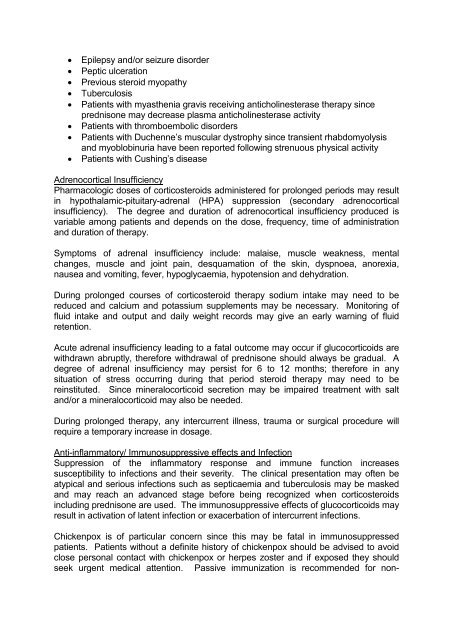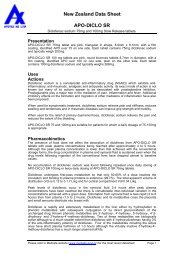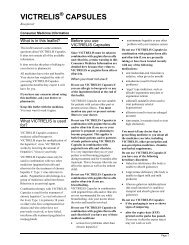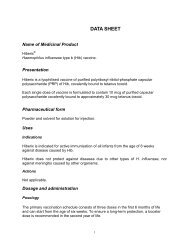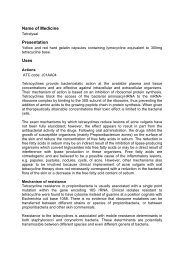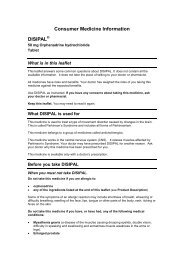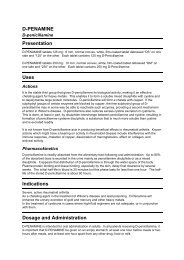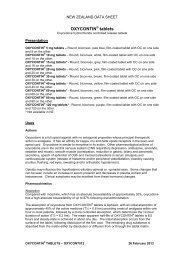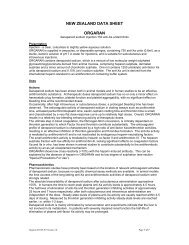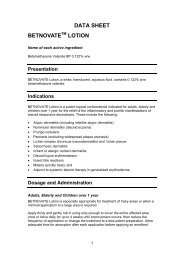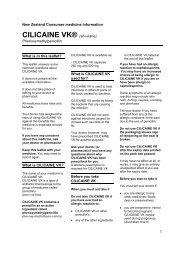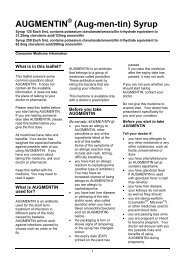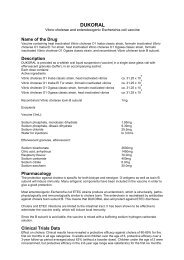DATA SHEET PREDNISONE - Medsafe
DATA SHEET PREDNISONE - Medsafe
DATA SHEET PREDNISONE - Medsafe
You also want an ePaper? Increase the reach of your titles
YUMPU automatically turns print PDFs into web optimized ePapers that Google loves.
• Epilepsy and/or seizure disorder<br />
• Peptic ulceration<br />
• Previous steroid myopathy<br />
• Tuberculosis<br />
• Patients with myasthenia gravis receiving anticholinesterase therapy since<br />
prednisone may decrease plasma anticholinesterase activity<br />
• Patients with thromboembolic disorders<br />
• Patients with Duchenne’s muscular dystrophy since transient rhabdomyolysis<br />
and myoblobinuria have been reported following strenuous physical activity<br />
• Patients with Cushing’s disease<br />
Adrenocortical Insufficiency<br />
Pharmacologic doses of corticosteroids administered for prolonged periods may result<br />
in hypothalamic-pituitary-adrenal (HPA) suppression (secondary adrenocortical<br />
insufficiency). The degree and duration of adrenocortical insufficiency produced is<br />
variable among patients and depends on the dose, frequency, time of administration<br />
and duration of therapy.<br />
Symptoms of adrenal insufficiency include: malaise, muscle weakness, mental<br />
changes, muscle and joint pain, desquamation of the skin, dyspnoea, anorexia,<br />
nausea and vomiting, fever, hypoglycaemia, hypotension and dehydration.<br />
During prolonged courses of corticosteroid therapy sodium intake may need to be<br />
reduced and calcium and potassium supplements may be necessary. Monitoring of<br />
fluid intake and output and daily weight records may give an early warning of fluid<br />
retention.<br />
Acute adrenal insufficiency leading to a fatal outcome may occur if glucocorticoids are<br />
withdrawn abruptly, therefore withdrawal of prednisone should always be gradual. A<br />
degree of adrenal insufficiency may persist for 6 to 12 months; therefore in any<br />
situation of stress occurring during that period steroid therapy may need to be<br />
reinstituted. Since mineralocorticoid secretion may be impaired treatment with salt<br />
and/or a mineralocorticoid may also be needed.<br />
During prolonged therapy, any intercurrent illness, trauma or surgical procedure will<br />
require a temporary increase in dosage.<br />
Anti-inflammatory/ Immunosuppressive effects and Infection<br />
Suppression of the inflammatory response and immune function increases<br />
susceptibility to infections and their severity. The clinical presentation may often be<br />
atypical and serious infections such as septicaemia and tuberculosis may be masked<br />
and may reach an advanced stage before being recognized when corticosteroids<br />
including prednisone are used. The immunosuppressive effects of glucocorticoids may<br />
result in activation of latent infection or exacerbation of intercurrent infections.<br />
Chickenpox is of particular concern since this may be fatal in immunosuppressed<br />
patients. Patients without a definite history of chickenpox should be advised to avoid<br />
close personal contact with chickenpox or herpes zoster and if exposed they should<br />
seek urgent medical attention. Passive immunization is recommended for non-


